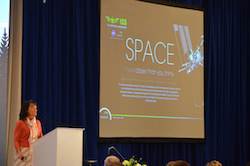 If NASA is looking for extraordinary out in space, CASIS is looking for extraordinary right here on earth. The Center for Advancement of Science in Space (CASIS) manages the laboratory on the International Space Station (ISS), providing resources needed to launch research and innovation that comes from experiments in micro gravity. Breakthroughs in space often lead to breakthroughs on earth.
If NASA is looking for extraordinary out in space, CASIS is looking for extraordinary right here on earth. The Center for Advancement of Science in Space (CASIS) manages the laboratory on the International Space Station (ISS), providing resources needed to launch research and innovation that comes from experiments in micro gravity. Breakthroughs in space often lead to breakthroughs on earth.
Here at the American Seed Trade Association annual meeting Debbie Wells shared a presentation about Tomatosphere; a mission to engage students with projects pertaining to growing plants in space.
“We have some goals over the next ten years. One of those is to reach over 2 million students as part of that education. And the tomatosphere cooperation is going to help up with that goal, as well as help ya’ll expand that program in the United States.”
That program she’s referring to is First the Seed, a response by ASTA to Canada’s success getting STEM and space into the classroom. The opportunity to experiment in space offers so many possibilities. Already they’ve had great success creating crystals in the micro gravity environment which enabled researchers to produce a more effective drug treatment for patients with muscular dystrophia. Scientists hope for similar opportunities with seeds.
“We’re beginning to see some really interesting research results about gene expression and how, when microgravity is affecting the plants it is a stressor, just like pH or temperature or any of those other things. And we can study that,” explains Wells. They can study that and so can students. School children will be sending 1.2 million tomato seeds to ISS next month. Once they’ve germinated, results can be compared to plants grown in the classroom. Within the next year and a half or so astronauts hope to be eating fresh tomatoes grown right on the space station.
Wells invites members of ASTA to be part of the program in several ways. She’s looking to work together with companies that already have STEM programs to connect science to students. They also need experts in the areas of research to help with projects. Another option is to bring Tomatosphere into your local school or donate to help keep the project free to kids.
You can listen to the complete message here: Remarks by Debbie Wells, CASIS
